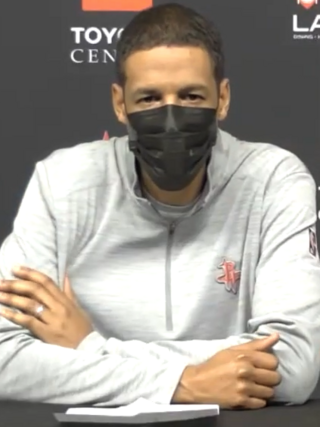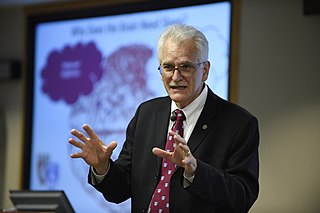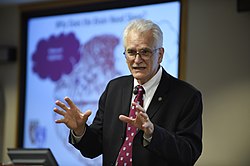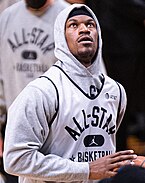
Sleep is a state of reduced mental and physical activity in which consciousness is altered and certain sensory activity is inhibited. During sleep, there is a marked decrease in muscle activity and interactions with the surrounding environment. While sleep differs from wakefulness in terms of the ability to react to stimuli, it still involves active brain patterns, making it more reactive than a coma or disorders of consciousness.

Earvin "Magic" Johnson Jr. is an American businessman and former professional basketball player. Often regarded as the greatest point guard of all time, Johnson spent his entire career with the Los Angeles Lakers in the National Basketball Association (NBA). After winning a national championship with the Michigan State Spartans in 1979, Johnson was selected first overall in the 1979 NBA draft by the Lakers, leading the team to five NBA championships during their "Showtime" era. Johnson retired abruptly in 1991 after announcing that he had contracted HIV, but returned to play in the 1992 All-Star Game, winning the All-Star MVP Award. After protests against his return from his fellow players, he retired again for four years, but returned in 1996, at age 36, to play 32 games for the Lakers before retiring for the third and final time.

A siesta is a short nap taken in the early afternoon, often after the midday meal. Such a period of sleep is a common tradition in some countries, particularly those in warm-weather zones. The "siesta" can refer to the nap itself, or more generally to a period of the day, generally between 2 and 5 p.m. This period is used for sleep, as well as leisure, midday meals, or other activities.
Polyphasic sleep is the practice of sleeping during multiple periods over the course of 24 hours, in contrast to monophasic sleep, which is one period of sleep within 24 hours. Biphasicsleep refers to two periods, while polyphasic usually means more than two. Segmented sleep and divided sleep may refer to polyphasic or biphasic sleep, but may also refer to interrupted sleep, where the sleep has one or several shorter periods of wakefulness, as was the norm for night sleep in pre-industrial societies.

A power nap or cat nap is a short sleep that terminates before deep sleep. A power nap is intended to quickly revitalize the sleeper.
Shift work is an employment practice designed to keep a service or production line operational at all times. The practice typically sees the day divided into shifts, set periods of time during which different groups of workers perform their duties. The term "shift work" includes both long-term night shifts and work schedules in which employees change or rotate shifts.
Shift work sleep disorder (SWSD) is a circadian rhythm sleep disorder characterized by insomnia, excessive sleepiness, or both affecting people whose work hours overlap with the typical sleep period. Insomnia can be the difficulty to fall asleep or to wake up before the individual has slept enough. About 20% of the working population participates in shift work. SWSD commonly goes undiagnosed, and it is estimated that 10–40% of shift workers have SWSD. The excessive sleepiness appears when the individual has to be productive, awake and alert. Both symptoms are predominant in SWSD. There are numerous shift work schedules, and they may be permanent, intermittent, or rotating; consequently, the manifestations of SWSD are quite variable. Most people with different schedules than the ordinary one might have these symptoms but the difference is that SWSD is continual, long-term, and starts to interfere with the individual's life.

Stephen Silas is an American basketball coach. He is the son of NBA star player and head coach Paul Silas.

Sleep deprivation, also known as sleep insufficiency or sleeplessness, is the condition of not having adequate duration and/or quality of sleep to support decent alertness, performance, and health. It can be either chronic or acute and may vary widely in severity. All known animals sleep or exhibit some form of sleep behavior, and the importance of sleep is self-evident for humans, as nearly a third of a person's life is spent sleeping. Sleep deprivation is common as it affects about one-third of the population.
Games held by the National Basketball Association (NBA) on Christmas Day, December 25, have been an annual tradition since the league's second season in 1947. Since 2008, five games have been played on Christmas. Since 1995, the current NBA champions play a game on Christmas Day. Unlike the National Football League (NFL)'s traditional Thanksgiving Day games, the NBA's Christmas Day games have no fixed opponents; rather, they feature some of the best teams and players.

Charles Andrew Czeisler is a Hungarian-American physician and sleep and circadian researcher. He is a leading researcher and author in the fields of the effects of light on human physiology, circadian rhythms and sleep medicine.

Second wind, a colloquial name for the scientific term wake maintenance zone, is a sleep phenomenon in which a person, after a prolonged period of staying awake, temporarily ceases to feel drowsy, often making it difficult to fall asleep when exhausted. They are the result of circadian rhythms cycling into a phase of wakefulness. For example, many people experience the effects of a second wind in the early morning even after an entire night without sleep because it is the time when they would normally wake up.
The 2012–13 NBA season was the 67th season of the National Basketball Association (NBA). The regular season began on October 30, 2012, when the 2011–12 NBA champions Miami Heat started the season by hosting the Boston Celtics. The 2013 NBA All-Star Game was played on February 17, 2013, at Toyota Center in Houston, Texas. The regular season ended on April 17, 2013, and the playoffs began on April 20, 2013, and ended on June 20, 2013, with the Miami Heat defeating the San Antonio Spurs in seven games to win the 2013 NBA Finals.

Steven Gerald Clifford is an American professional basketball coach and executive who serves as a front office advisor for the Charlotte Hornets of the National Basketball Association (NBA). He previously served as the head coach of the Hornets and the Orlando Magic.

Sleep deprivation – the condition of not having enough sleep – is a common health issue for students in higher education. This issue has several underlying and negative consequences, but there are a few helpful improvements that students can make to reduce its frequency and severity.
The 2019–20 NBA season was the 74th season of the National Basketball Association (NBA). The regular season began on October 22, 2019, and originally was supposed to end on April 15, 2020. The 2020 NBA All-Star Game was played on February 16, at the United Center in Chicago, and was won by Team LeBron, 157–155. The playoffs were originally scheduled to begin on April 18, and end with the NBA Finals in June.

Sleep is a naturally recurring state of mind and body, characterized by altered consciousness, relatively inhibited sensory activity, reduced muscle activity, and inhibition of nearly all voluntary muscles during rapid eye movement (REM) sleep, and reduced interactions with surroundings. An essential aspect of sleep is that it provides the human body with a period of reduced functioning that allows for the systems throughout the body to be repaired. This time allows for the body to recharge and return to a phase of optimal functioning. It is recommended that adults get 7 to 9 hours of sleep each night. Sleep is regulated by an internal process known as the circadian rhythm. This 24-hour cycle regulates periods of alertness and tiredness that an individual experiences. The correlation between psychological stress and sleep is complex and not fully understood. In fact, many studies have found a bidirectional relationship between stress and sleep. This means that sleep quality can affect stress levels, and stress levels can affect sleep quality. Sleep change depends on the type of stressor, sleep perception, related psychiatric conditions, environmental factors, and physiological limits.
The 2020–21 NBA season was the 75th season of the National Basketball Association (NBA), though the 75th anniversary was not celebrated until the following season. Due to the COVID-19 pandemic, the regular season was reduced to 72 games for each team, and began on December 22, 2020. The season started just 72 days after the completion of the 2020 NBA Finals, the shortest off-season in league history. The 2021 NBA All-Star Game was played on March 7, at State Farm Arena in Atlanta, and was won by Team LeBron, 170–150. For the first time, the NBA staged a play-in tournament for teams ranked 7th through 10th in each conference from May 18 to 21. The playoffs then ran under the standard 16-team playoff format from May 22 to July 20, 2021. Due to COVID-19 cross-border restrictions imposed by the Canadian government, the Toronto Raptors played their 2020–21 home games at Amalie Arena in Tampa, Florida.

The 2021 NBA All-Star Game was an exhibition basketball game played on March 7, 2021, during the National Basketball Association's (NBA) 2020–21 season. It was the 70th edition of the NBA All-Star Game, and was hosted at State Farm Arena in Atlanta, home of the Atlanta Hawks. With teams captained by LeBron James and Kevin Durant, Team LeBron won the game 170–150. Giannis Antetokounmpo of Team LeBron was named the All-Star Game Most Valuable Player. The game was originally scheduled to be held in Indianapolis, but it was relocated to Atlanta due to the COVID-19 pandemic and resulting scheduling conflicts with the 2021 NCAA Division I men's basketball tournament. The game was televised nationally on TNT for the 19th consecutive year, and simulcast on TBS for the 7th consecutive year.
The 2022–23 NBA season was the 77th season of the National Basketball Association (NBA). The regular season began on October 18, 2022, and ended on April 9, 2023. The 2023 NBA All-Star Game was played on February 19, 2023, at Vivint Arena in Salt Lake City. The play-in tournament was held on April 11–14, 2023. The 2023 NBA playoffs then began on April 15, and ended on June 12 with the Denver Nuggets defeating the Miami Heat in 5 games in the 2023 NBA Finals.














